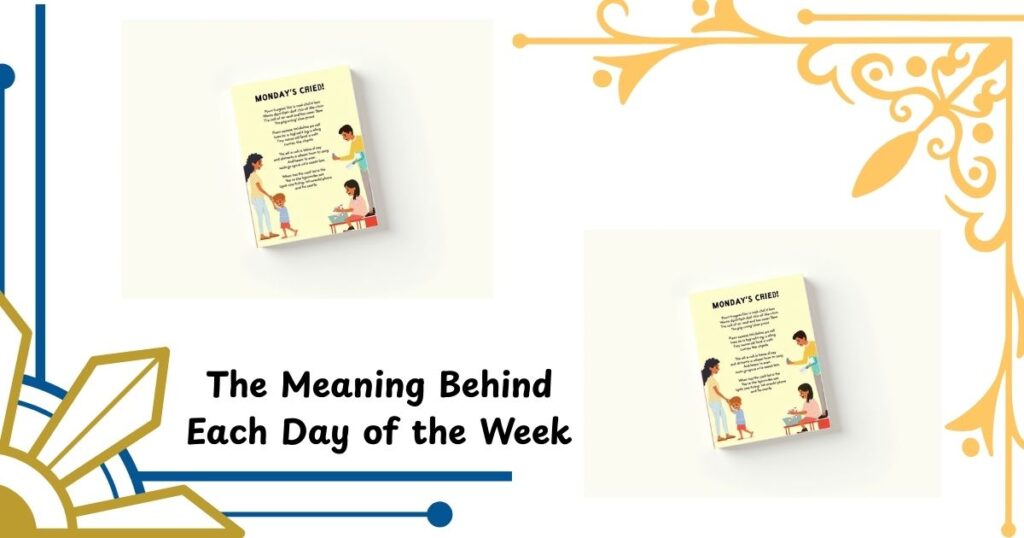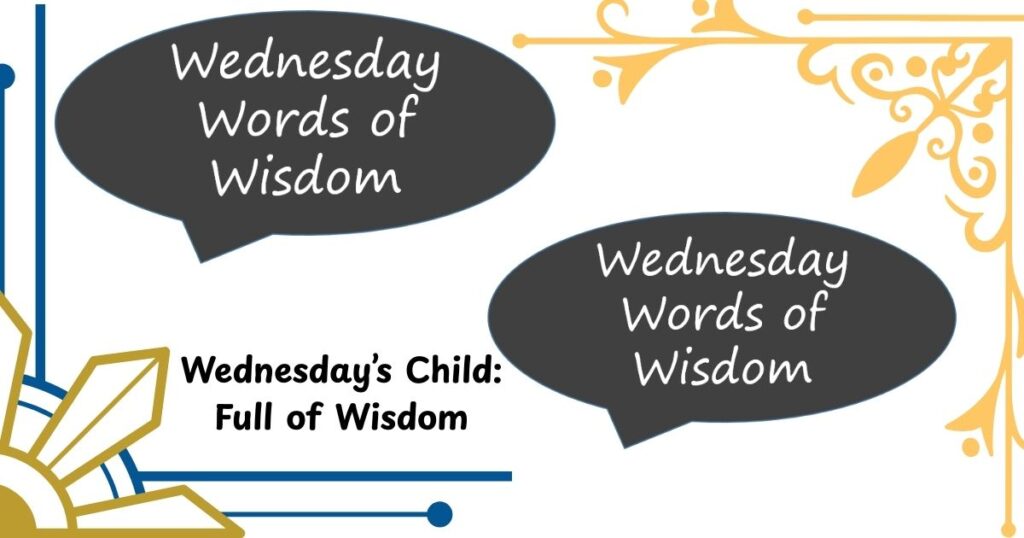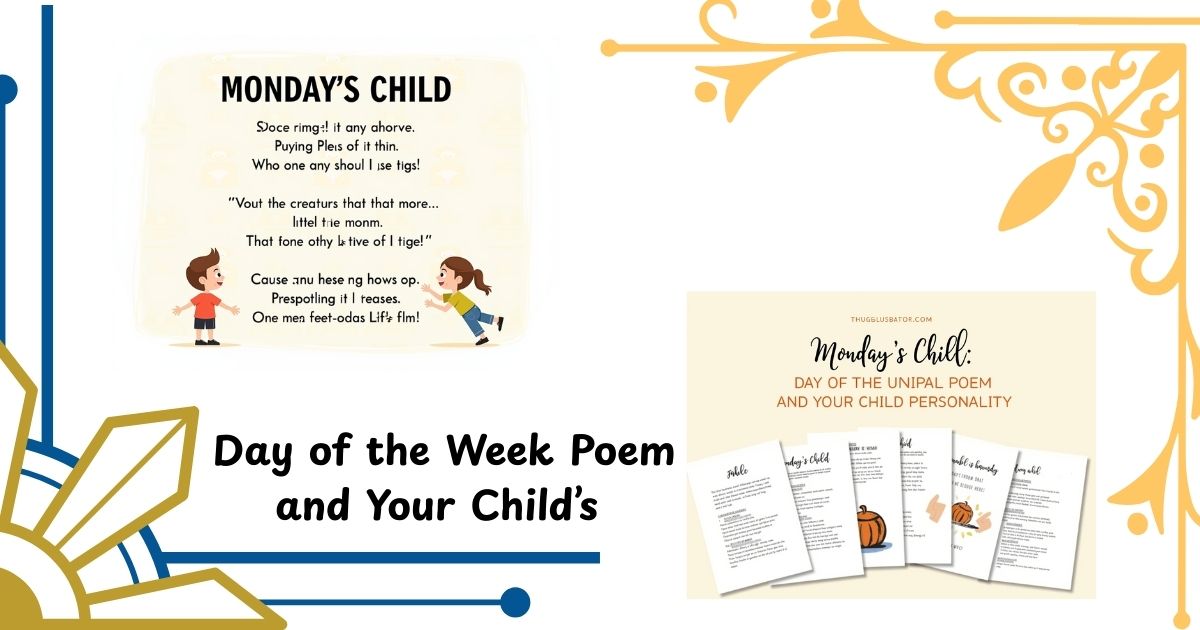The Monday’s Child poem is a classic day of the week rhyme that parents still love in 2025. This traditional children’s poem links birth days with unique traits, offering a fun way to explore your child’s personality.
From the Sunday’s child poem meaning of joy to the Thursday child meaning of ambition, each verse adds charm. Discover how this old nursery rhyme personality guide still inspires families today.
What Is the Monday’s Child Poem?
The Monday’s Child poem is a classic day of the week rhyme that has been shared for generations. First recorded in the 19th century, in works like Traditions of Devonshire by A.E. Bray, it connects a child’s birth day with personality traits.
Parents once believed the days of the week child poem could predict character, beauty, and fortune. Today, it’s more of a fun nursery rhyme personality guide.
From the Monday’s child fair of face to the cheerful Sunday’s child poem meaning, each verse captures the imagination. Families often use it to teach children about days, traditions, and the joy of old nursery rhymes.
The Meaning Behind Each Day of the Week

Each verse in the Monday’s Child nursery rhyme variations carries a special meaning. The poem links a child’s birthday with traits like charm, kindness, ambition, or joy. Parents enjoy using it to celebrate their child’s uniqueness.
For example, the Tuesday child meaning highlights grace, while the Saturday child meaning values hard work. Some see it as light folklore, others as a fun parenting tradition. With cultural ties to old English children’s rhymes, it still feels magical today.
Whether read aloud in nurseries, written in keepsake books, or sung as children’s day of the week songs, this poem brings families closer.
Monday’s Child: Full of Grace
In many modern versions of Monday’s Child, the phrase says “fair of face” or “full of grace.” The Monday’s Child poem words describe children born on Monday as beautiful or graceful.
Parents often view it as a sweet blessing, linking Monday birthdays with charm and kindness. Though not meant as fact, it adds fun to parenting traditions.
Many families enjoy using this rhyme when planning nursery themes inspiration or baby keepsakes. The Monday’s Child poem reminds us that children born on Monday are celebrated for their brightness and gentle spirit, making it a lovely piece of folklore and family joy.
Tuesday’s Child: Full of Talent
The Tuesday child meaning often reads as “full of grace.” Parents sometimes wonder about the Tuesday’s child is full of grace meaning, which connects to elegance, empathy, and kindness.
Some versions describe Tuesday’s child as full of talent, linking it to creativity and ambition. In nursery rhyme personality traditions, being born on Tuesday symbolizes a child with gifts to share and the ability to inspire others.
Families love celebrating this verse with playful songs, nursery wall art, or bedtime reading. It’s a charming way to highlight a child’s unique spirit while enjoying the beauty of traditional children’s poems.
Wednesday’s Child: Full of Wisdom

The Wednesday child meaning is sometimes written as “full of woe,” but many modern parents prefer seeing it as “full of wisdom.” In folklore, this line was thought to represent a sensitive or thoughtful nature.
Today, families view it as a reminder of empathy, strength, and emotional depth. The Monday’s Child nursery rhyme variations allow parents to embrace a positive outlook, focusing on inner intelligence instead of sadness.
A Wednesday’s child may be seen as caring, wise, and insightful. This verse adds character to the days of the week child poem, connecting children to rich cultural traditions and timeless charm.
Thursday’s Child: Full of Energy
The Thursday child meaning is famously described as “far to go.” While it once hinted at long journeys or challenges, today parents often see it as a symbol of ambition, drive, and energy.
The day of the week rhyme celebrates Thursday’s child as someone who works hard, chases dreams, and grows strong through life’s adventures. In modern parenting, this line is a reminder that effort and determination shape success.
Families may even use this verse as encouragement for school, sports, or future goals. This playful nursery rhyme personality trait keeps the tradition alive while inspiring children to aim high.
Friday’s Child: Full of Love

The Friday verse describes children as “loving and giving,” making it one of the sweetest parts of the Monday’s Child poem. The meaning ties to generosity, affection, and joy. Parents often see Friday’s child as naturally kind and warm-hearted.
In folklore, this verse symbolized good fortune and harmony, making Fridays a blessed day to be born. Today, it inspires families to celebrate traits like empathy and compassion in their children.
From bedtime stories to nursery decorations, the days of the week child poem continues to highlight Friday’s children as bringers of love, laughter, and lasting joy in families.
Saturday’s Child: Hardworking and Strong
The Saturday child meaning is often written as “works hard for a living.” This line connects to traits like dedication, strength, and a solid work ethic.
Parents admire this verse because it encourages children to value effort and perseverance. While it may sound serious, many see it as a blessing that highlights determination and character. In nursery rhyme personality traditions, being born on Saturday means resilience.
Families today use it to teach children the importance of focus and responsibility. The Monday’s Child poem shows that Saturday’s children carry the gift of endurance and inspire others with their steady hearts.
Sunday’s Child: Blessed and Bright
The Sunday’s child poem meaning is joyful and full of light. It often describes a child as “bonny and blithe, good and gay,” symbolizing happiness and blessing.
In folklore, Sunday was considered a lucky birth day, tied to the Sabbath day and faith. Parents cherish this verse because it paints Sunday’s children as cheerful, blessed, and full of life.
Today, it remains one of the most positive lines in the days of the week child poem. Whether sung as the Addams Family Days of the Week song or read in bedtime stories, Sunday’s child always shines bright.
How the Poem Reflects Personality Traits

The Monday’s Child poem is more than a rhyme—it’s a playful way to explore birth day personality traits. From beauty and charm in children to work ethic and diligence, each line suggests qualities tied to a child’s birth day.
While folklore once treated these verses as predictions, modern families see them as fun traditions. They bring empathy, joy, ambition, and generosity into focus.
By reading or reciting this traditional children’s poem, parents create connections between past culture and present parenting, keeping the magic alive. The poem reflects not just traits but also a love of storytelling and family tradition.
Fun Ways to Use the Monday’s Child Poem With Kids
Parents today use the Monday’s Child poem in many creative ways. It can be part of baby girl nursery themes, baby boy nursery themes, or even gender-neutral nursery ideas.
Families also enjoy it in bedtime reading, keepsake books, or birthday celebrations. Teachers sometimes use the days of the week child poem to help kids learn days while having fun.
The verses are also found in children’s songs like the Addams Family days of the week tune. By weaving the poem into activities, parents pass down a whimsical family tradition that builds memories while teaching values like kindness and joy.
Monday’s Child Poem in Modern Parenting (2025)
In 2025, the Monday’s Child poem is still loved in parenting circles. While once seen as a superstition, today it is more about bonding, learning, and joy.
Families use the day of the week rhyme in creative parenting—like nursery décor, books, and even digital apps that calculate a child’s birth day with tools like the day of the week calculator (Zeller’s Algorithm).
It continues to inspire discussions about cultural interpretations of days, old traditions, and the fun side of folklore. The poem blends history, parenting, and play, making it a lasting treasure in family life.
FAQs About the Monday’s Child Poem
Where did the Monday’s Child poem come from?
It was first published in the 19th century in works like Traditions of Devonshire (1838).
What does “Tuesday’s child is full of grace” mean?
It suggests kindness, elegance, and talent.
Is Wednesday’s child really full of woe?
In modern versions, many say Wednesday’s child meaning is wisdom instead.
Why is Sunday’s child special?
The Sunday’s child poem meaning is joy, blessing, and happiness.
Can parents use this poem today?
Yes, it’s a fun way to teach days, celebrate birthdays, and build family traditions.
Final Thoughts on Children’s Personalities and the Poem
The Monday’s Child poem remains a beloved part of childhood, weaving folklore about birthdays with family joy.
Whether exploring the Monday’s Child poem words, reflecting on the Thursday child meaning, or smiling at the Sunday’s child poem meaning, parents still find beauty in its verses.
It may not predict fate, but it nurtures love, creativity, and memory-making. This day of the week rhyme reminds families that every child, no matter the day, is truly a gift.











